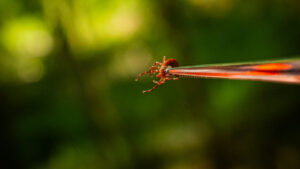Street lights burning all night cause leaves to become so sticky that insects cannot eat them, threatening the food chain, a study has found.
Scientists noted that trees in urban ecosystems showed much less damage than those in more rural areas. Their research, published in Frontiers in Plant Science, shed light on a possible reason.
“We observed that, compared to natural ecosystems, tree leaves in most urban ecosystems generally show few signs of insect damage. We were curious as to why,” said the study’s author, Dr Shuang Zhang of the Chinese Academy of Sciences. “In two of the most common tree species in Beijing, artificial light at night led to increased leaf toughness and decreased levels of foliar herbivory.”
Artificial light from street lights had a surprising effect on the leaves of trees examined. The scientists tested two common types of street trees in Beijing: Japanese pagoda and green ash trees. The pagoda trees have smaller, softer leaves that insects prefer to feast on. Researchers thought plants in areas with high levels of artificial light might focus on defense rather than growth, which would mean their leaves would be tougher, with more chemical defense compounds.
To test the trees, they found 30 sampling sites on main roads that are usually lit by street lights all night. They measured the amount of light – illumination – at each site and then tested the leaves of the trees for toughness. They tested nearly 5,500 leaves for traits including size, toughness, water content, and levels of nutrients and chemical defenses.
If the leaves were larger, it would indicate that plants directed their energy to growing leaves, but if they were tough and contained tannins or other chemical defenses, it would indicate that they allocated their energy to defending themselves.
They found that the more lighting there was, the harder the leaves. In the areas most brightly lit at night, the leaves were extremely tough and showed no sign of insects feasting on them.
Researchers said that although they did not fully understand why this happened, they suggested that trees exposed to artificial light could extend their photosynthesis duration.
While a tree with pristine leaves may be more pleasant to look at for some people, it can be a bad sign for the ecosystem.
“Leaves that are free from insect damage can bring comfort to people, but not insects,” Zhang said. “Herbivory is a natural ecological process that maintains the biodiversity of insects.”
Zhang added: “Reduced herbivory can lead to trophic cascade effects in ecology. Lower levels of herbivory imply lower abundances of herbivorous insects, which in turn may lead to lower abundances of predatory insects, insectivorous birds, and so on. The decline of insects is a global pattern that has been observed over the past decades. We need to pay more attention to this trend.”






